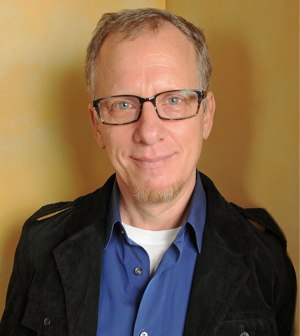The Times of Harvey Milk's Rob Epstein on Docs, Reality TV, and Keeping Harvey Alive on Film
 You've seen Gus Van Sant's Milk, but for the real story of slain San Francisco city supervisor (and gay rights pioneer/martyr) Harvey Milk, you absolutely must watch Rob Epstein's Oscar-winning 1984 documentary The Times of Harvey Milk. The Criterion Collection releases a gorgeous Blu-ray this week, which features the thoroughness for which the company is famous -- a new digital transfer, terrific essays, an informative commentary, and featurettes on everything from the making of the film to the investigation of the assassination of Milk and mayor George Moscone.
You've seen Gus Van Sant's Milk, but for the real story of slain San Francisco city supervisor (and gay rights pioneer/martyr) Harvey Milk, you absolutely must watch Rob Epstein's Oscar-winning 1984 documentary The Times of Harvey Milk. The Criterion Collection releases a gorgeous Blu-ray this week, which features the thoroughness for which the company is famous -- a new digital transfer, terrific essays, an informative commentary, and featurettes on everything from the making of the film to the investigation of the assassination of Milk and mayor George Moscone.
For Epstein, the success of The Times of Harvey Milk would launch one of the great documentary careers in American cinema; his works (most of them co-directed with Jeffrey Friedman) also include the gays-on-film doc The Celluloid Closet, the moving AIDS piece Common Threads: Stories from the Quilt, and the documentary Paragraph 175, about gay men who survived Nazi concentration camps. In 2010, Epstein and Friedman made their narrative debut with Howl, a fascinating exploration of the landmark poem by Allen Ginsberg, portrayed indelibly in the film by James Franco.
One thing I didn't know until I listened to your commentary was that you were already working on a film about the phenomenon of Harvey Milk before he was assassinated.
We were looking at what was going on in California, the Briggs Initiative campaign -- which was really the first big gay rights battle [had voters approved the initiative, openly gay and lesbian schoolteachers would have lost their jobs] -- and I was interested in telling that story, and through telling that story I saw that Harvey Milk was really the embodiment of everything I was going for in that other story.
Take me back to the day he was shot -- in addition to the shock and tragedy of it, as a filmmaker, how did that affect you in terms of realizing that this was now going to be a big part of the story you were telling?
I think it affected me by just internalizing what that day was like and what happened. I'm getting chills just thinking about it right now. I was in a store buying coffee with a friend who I was working on the project with, a photographer, and I went right to City Hall and experienced that scene that I was later able to render, just that kind of absolute stunned silence outside of City Hall. And then I immediately went to Harry Britt's house, who was Harvey's good friend and became his successor, and a number of us were involved in planning the candlelight march, and I was a participant in that, and right on the front steps, watching Dianne Feinstein in her shining moment that night. So I think it was really having that life-changing experience and knowing that [no coverage of Milk's death] that I had seen up to that point was presented in a way that would have the same kind of emotional value that it had for me.
And that's really what I aimed to do with the movie -- to really have any viewer who might watch the movie understand the significance of Harvey Milk, and why his assassination and Moscone's was such an incredible tragedy and life-changing occurrence.
The film really brings together the idea of "the personal is the political."
Yeah, which is why we chose those eight people who are on camera, because they were able to tell that story very personally, as opposed to people who might have had more of a political connection to the story.
In the commentary, you discuss the drama The Battle of Algiers as a movie that inspired you. And again, it's that mix of the personal and political that makes The Times of Harvey Milk such a standout, even among documentaries about politics and political figures. Were there other non-fiction films that you found inspirational?
There were films that I was inspired by, and others where I learned that I didn't want to go in that direction. Of the former, Harlan County USA, Barbara Kopple's film, I saw that and realized how she and those filmmakers took me into a situation that I never otherwise would have known about or even thought about, and made me feel so invested in, the Appalachian coal-miners. And that was an inspiration, to think that that's really what I wanted to do with this provincial story in San Francisco -- that anyone who saw it could come to understand what was at stake.
Another film, Jon Else's The Day After Trinity, was the first film which was about a big piece of history told through the perspective of one character who was pivotal to that history. But also, the craft of the filmmaking in that film -- it was the first time I saw, or was really aware of, how to use music in a documentary. Music was very important to The Times of Harvey Milk, and Jon's film really helped me to understand that.
Pages: 1 2

Comments
I really enjoyed "Milk," but I just couldn't get over the fact that it "borrowed" so generously from this documentary. I mean, the structure was pretty much the same, many scenes were lifted wholesale. I am glad "Milk" has some success, but "The Times of Harvey Milk" is so far superior and a much more emotional experience.